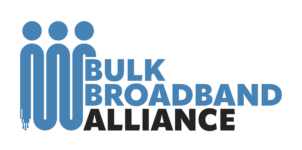New Coalition Launches to Champion the Bulk Billing Arrangement Model for Internet Services
WASHINGTON, July 23, 2024 /PRNewswire/ — Today, EducationSuperHighway, the Community Associations Institute (CAI), the National Multifamily Housing Council (NMHC), the National Apartment Association (NAA), and America’s Communications Association (ACA Connects) launched the Bulk Broadband Alliance (BBA). This Alliance is dedicated to educating the public and policymakers on the important benefits of bulk billing arrangements for broadband and cable TV services and ensuring these benefits remain available to and undiminished for consumers. This comes as the FCC is exploring new rules on these arrangements.
Bulk billing arrangements are most commonly found in larger U.S. multi-dwelling units (MDUs), such as apartments, condominium and homeowner association-governed properties (community-governed properties), senior living facilities, and student housing. These larger MDUs account for about 30% of the nation’s housing stock. This billing model, in which internet and cable TV services are typically bundled into residents’ community fees or rent, similar to other property amenities, offers an alternative to traditional retail service.
The bulk billing model offers substantial advantages over traditional retail service offerings. Monthly bulk pricing is typically 50% lower than promotional rates for comparable retail packages, and unlike retail plans, bulk plans normally do not include extra nonrecurring fees like installation charges. Beyond cost savings, bulk agreements elevate the quality of service compared to retail because bulk providers who negotiate with property owners are incentivized to invest in infrastructure upgrades, resulting in faster speeds, minimum performance standards, and enhanced digital amenities at properties. Furthermore, bulk billing leads to a better customer experience due to a convenient setup process, guaranteed reliability, and dedicated customer support.
According to Dawn M. Bauman, CAE, Chief Strategy Officer, Community Associations Institute (CAI) which serves the interests of condominiums, housing cooperatives, homeowners associations, and their residents, “Bulk billing provides a strategic advantage for MDUs and consumers, unlocking greater technology at a lower rate. These arrangements generally translate to cost savings on services like internet and cable TV, while providing a level of quality and reliability that surpasses traditional retail service. This long-standing model continues to prove its value to residents in multi-dwelling units and all communities.”
Bulk billing arrangements also reduce barriers to broadband adoption, aiding in efforts to close the digital divide. They can incentivize infrastructure upgrades, which is particularly important for low-income housing, as these properties are often not among the first to receive such improvements from retail providers. Moreover, bulk billing’s lower monthly prices and lack of nonrecurring fees help reduce affordability barriers to adoption. Lastly, bulk billing bypasses retail broadband enrollment requirements, which can be barriers for low-income consumers, by having a convenient and automatic setup and eliminating credit checks.
These are some of the reasons that government and nonprofit agencies utilize bulk agreements to directly purchase internet service for low-income households at extremely advantageous terms, like the City of Charlotte with its AccessCharlotte Program and New York City’s Big Apple Connect Program.
“Bulk billing agreements have become a cornerstone of digital equity initiatives,” said Adeyinka Ogunlegan, Vice President of Government Affairs and Policy at EducationSuperHighway, a non-profit organization with the mission to close the digital divide. “In today’s digital world, internet access is vital for obtaining essential services, education, healthcare, and opportunities. Bulk billing has been pivotal in making it affordable for residents in multi-dwelling units, especially those in public and affordable housing, to connect to the online world. Regulation of these agreements would not only jeopardize the progress made in bridging the digital divide but also threaten to deepen existing disparities, making essential online resources even more inaccessible for vulnerable populations.”
On March 4, 2024, FCC Chairwoman Jessica Rosenworcel announced her intent to seek support for a Notice of Proposed Rulemaking (NPRM) to ban bulk billing agreements or mandate that residents subjected to such agreements be permitted to opt-out of them. This proposed rule, if adopted, would reverse the Commission’s 2010 finding that bulk billing arrangements should not be regulated because they “predominantly benefit consumers, through reduced rates and operational efficiencies, and by enhancing deployment of broadband.”
“The Chairwoman’s proposals to regulate bulk billing arrangements, whether through an outright ban or an opt-out mandate, would undermine the economic rationale for bulk deals, driving up costs for consumers and hindering new deployments in MDUs,” said Sharon Wilson Géno, President of the National Multifamily Housing Council (NMHC), which represents rental housing providers. “This would harm residents and increase housing affordability challenges. At a time of increasing housing costs and not enough housing supply, our country cannot afford to increase costs, hurt service quality, and negatively impact critical broadband access.”
The Bulk Broadband Alliance will focus on amplifying the collective voice of stakeholders and educating policymakers about the benefits of bulk billing and the harms regulation would have on the millions of consumers who rely on these arrangements.
“ACA Connects members that offer bulk billing agreements are providing customers with discounted rates and quality service. The opportunities these agreements create also mean more competition and increased investment in fiber and other advanced infrastructure,” said President and CEO of ACA Connects, Grant Spellmeyer. “ACA Connects is proud to partner with other associations representing bulk billing purchasers and broadband advocacy groups in the Alliance to protect this win-win for our members and the communities they serve.”
To learn more about the Alliance, access resources on the benefits of bulk billing, or contact your U.S. Senators, Representative, and the FCC to voice opposition to FCC regulation of bulk billing visit https://protectbulkbroadband.com/. Entities (companies, associations, nonprofit organizations, government agencies, etc.) that support bulk billing and are interested in joining the coalition can apply for membership at https://protectbulkbroadband.com/join/.
Read more at PR Newswire
